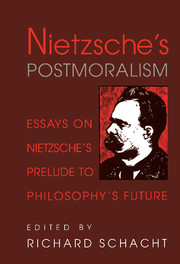Book contents
- Frontmatter
- Contents
- Contributors
- Preface
- A Note on References
- Introduction
- Nietzsche on the Illusions of Everyday Experience
- Masters without Substance
- Rethinking the Subject: Or, How One Becomes-Other Than What One Is
- The Youngest Virtue
- Morality as Psychology, Psychology as Morality: Nietzsche, Eros, and Clumsy Lovers
- On the Rejection of Morality: Bernard Williams's Debt to Nietzsche
- Nietzsche's Virtues: A Personal Inquiry
- Nietzschean Normativity
- Nietzsche's Perfectionism: A Reading of Schopenhauer as Educator
- Bibliography
Nietzsche on the Illusions of Everyday Experience
Published online by Cambridge University Press: 20 May 2010
- Frontmatter
- Contents
- Contributors
- Preface
- A Note on References
- Introduction
- Nietzsche on the Illusions of Everyday Experience
- Masters without Substance
- Rethinking the Subject: Or, How One Becomes-Other Than What One Is
- The Youngest Virtue
- Morality as Psychology, Psychology as Morality: Nietzsche, Eros, and Clumsy Lovers
- On the Rejection of Morality: Bernard Williams's Debt to Nietzsche
- Nietzsche's Virtues: A Personal Inquiry
- Nietzschean Normativity
- Nietzsche's Perfectionism: A Reading of Schopenhauer as Educator
- Bibliography
Summary
Appearance and Reality
Nietzsche, in maintaining that all of our ordinary, everyday experience is illusory, is propounding a view that had long been championed in philosophy. Since Parmenides, philosophers have repeatedly drawn a distinction between appearance and reality and repeatedly claimed that all ordinary experience is illusory. But they have also often offered advice about how one could transcend or evade the illusions of ordinary experience and achieve an awareness of reality that does not involve distortion. One repeatedly offered strategy, the “rationalistic” one, is to ignore the misleading evidence of the senses and instead nonsensuously think one's way to the truth about things as they really are.
Among Nietzsche's predecessors it was Kant who rendered the distinction between reality and its illusory appearance particularly problematic by arguing that there is no way to evade or transcend these illusions. Kant's epistemological strictures dismayed the German philosophers who directly followed him and stimulated them to develop strategies and methods that might enable us to reach that undistorted knowledge of reality that Kant had deemed forever out of reach.
Much of the philosophical activity that took place in Germany in the nineteenth century was devoted to this task. At the beginning of the century the great interest in a special capacity for “intellectual intuition” or a special “dialectical method” arose in large part from an interest in finding ways to escape from the severe limitations Kant had placed upon human knowledge.
- Type
- Chapter
- Information
- Nietzsche's PostmoralismEssays on Nietzsche's Prelude to Philosophy's Future, pp. 7 - 33Publisher: Cambridge University PressPrint publication year: 2000



